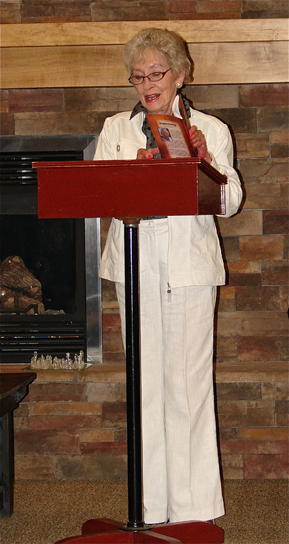
No Longer On The Run
Lorraine Fell’s reading at book launch, excerpted from the book
It seemed difficult to understand how such a widespread famine could occur in Ukraine, a country of  vast agricultural holdings with an abundance of arable land, a country Stalin often referred to as "the breadbasket of Russia” and even "the breadbasket of Europe”. Previous conflicts between Russia and Ukraine had usually been resolved through recognition of their economic dependence upon each other. According to historians, at this time Stalin perceived a growing insurrection among the Ukrainian people against his regime. Consumed with fears over the rise of Ukrainian nationalism, Stalin undertook drastic action to quell the supposed rebellion. In retrospect it is believed these fears became paranoiac. In a desperate move to solidify control of the people, Stalin is believed to have orchestrated a massive food shortage in Ukraine. During the years 1932-1933, up to 7.5 million people died of starvation ¬– a horrific event that also extended into Russia where many more millions perished for want of food.
vast agricultural holdings with an abundance of arable land, a country Stalin often referred to as "the breadbasket of Russia” and even "the breadbasket of Europe”. Previous conflicts between Russia and Ukraine had usually been resolved through recognition of their economic dependence upon each other. According to historians, at this time Stalin perceived a growing insurrection among the Ukrainian people against his regime. Consumed with fears over the rise of Ukrainian nationalism, Stalin undertook drastic action to quell the supposed rebellion. In retrospect it is believed these fears became paranoiac. In a desperate move to solidify control of the people, Stalin is believed to have orchestrated a massive food shortage in Ukraine. During the years 1932-1933, up to 7.5 million people died of starvation ¬– a horrific event that also extended into Russia where many more millions perished for want of food.
Since 2006 this event has been named the "Holodemor”. In English the word means "murder by hunger”, a premeditated genocide of the Ukrainian people, executed by Stalin. Some historians differ on the magnitude of the famine, and whether it had actually been carried out by Stalin. However, there is no denying the fact of the famine, nor of the astounding numbers of citizens in both countries who died, much less substantive evidence to prove the famine had occurred from natural causes.
Beyond the peace and tranquility of their lives at Talne, Andy and Halla were shielded from the terrible occurrences taking place around them. In comparison with the general populace, their lives on the large estate at Talne presented a unique situation: The estate itself was self-sufficient. Isolated from the general public the vast territory of the land alone provided happy diversions for the Klischenko family. Although Dimente likely worried about the extent of the famine, and the developing dangers around him, Andy and Halla were free to explore and enjoy the singular setting in which they lived.
Behind the big main house a small community existed to house Dimente’s staff. Outbuildings included barns for cattle and chickens and a large stable for the horses. Food was grown and prepared on the premises. One barn was used solely to store meat, enough to feed the community for a year. Ten-foot blocks of ice, covered with hay and buried underground, preserved the storage area at frigid temperatures. Vegetables, eggs and many other preserves were stored on shelves in an outside root cellar near the main house. Accessed by a door with stairs leading to a fair-sized room, the underground cellar was well-protected and reinforced with huge beams. There were no supermarkets then; consequently, such state-owned communities were almost entirely self-reliant.
Surrounded by oak trees and riding paths, Andy soon learned to ride with or without a saddle. Sometimes he took the horses swimming, riding his horse across the river by holding onto its mane. Situated a kilometre away, the original manor house on this huge estate had grown into a sprawling palace, now converted into an agricultural college for students. Andy liked to ride over to watch the older boys play soccer. He says the boys often indulged him, teaching him how to kick a soccer ball and play the game. He developed a natural affinity for the game ¬– an ability that would later become a valuable asset. Free to explore the countryside at will, Andy’s years at Talne generated his lifelong interest in wildlife and an appreciation of country living in general.
Andy and Halla were driven to school in a closed coach/sleigh in winter. The coach was not fully enclosed; the rear was open, but a high-rounded seat-back shielded them from the wind. In front, a ‘coacher’ or chauffeur sat high on an enclosed cab-like perch. His vision protected from the elements, the driver easily steered the two horses from a small opening in the front panel. Andy remembers riding to school in this conveyance, cozy and warm under thick sheepskin blankets. In the summer the family rode in an open horse-drawn coach, sometimes pulled by a troika of three horses.
The coachers were part of Dimente’s staff and also lived on the premises. If Dimente’s work required him to travel a long distance, a coacher was summoned from a hand-rung telephone box in Dimente’s office. The coacher then quickly pulled up with the horses to drive Dimente to the Talne railway station. Besides having a coacher at the family’s disposal, the children grew up with a nanny. She lived with them in the house and looked after all their needs. Andy says wherever the family went, the nanny always travelled with them. Until Andy turned twelve, he remembers the years at Talne as the happiest of times for him and his family.
Then, one night without warning the comfort and security of their lives abruptly changed forever. It was March 8, 1938, International Women’s Day. On that fateful night, asleep in their beds, the family awakened to a loud pounding on the front door. The Soviet NKVD (secret police), amid much shouting and confusion entered their home. Ruthlessly, they proceeded to ransack the house and forcibly remove Andy’s father from his home. In that one invasive stroke Andy’s world was shattered. He never saw his father again.
